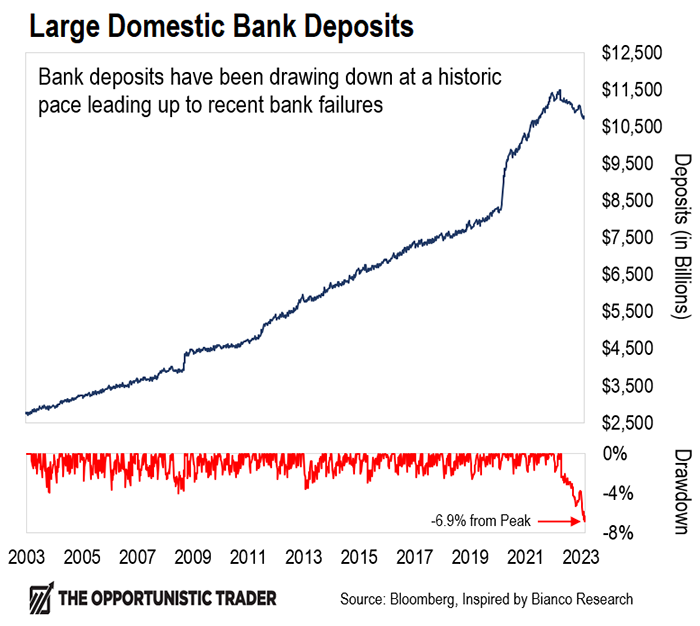There are three things we can be certain of… death, taxes, and Fed policy errors.
They didn’t normalize rates when they had the chance in 2018, or in early 2021 when inflation was already visibly getting out of control.
Now they’re trying to fix what they broke and are making it all worse, at the wrong time.
When the news of Silicon Valley Bank’s (SVB) implosion broke, the market went from pricing in a Fed Funds rate near 5.5% by year-end to pricing in a rate of around 4%.
That means the market went from assuming an additional 125 basis points (bps) of hikes… to looking forward to rate cuts. At one point, rates dropped so much that some thought the Fed would begin cutting rates this week…
And why wouldn’t they? The Fed has capitulated to the market many times before.
Yet the Fed members ultimately decided to stay the course and raised rates by 25 bps.
Not only that, but they will maintain their pace of reducing the Treasury’s mortgage-backed security (MBS) holdings. The balance sheet will continue to get run down.
The Fed believes this year’s bank failures are isolated incidents… not a return to 2008’s systemic problems.
But while they can kick the can down the road, the Fed is going to have to eventually cut rates.
The Fed Didn’t See It Coming
The most troubling part of Powell’s statement this week was that the Fed didn’t see any of these bank issues coming.
I repeat… THEY DIDN’T SEE IT COMING.
Yet the chart below shows bank deposits collapsing in the weeks and months ahead of SVB’s failure – data which comes from the Fed itself, by the way.

In the weeks and months leading to SVB’s failure, bank deposits were drawing down at the fastest pace in more than two decades. And it wasn’t by a little… It was by an amount that should have raised eyebrows.
So how on Earth didn’t the Fed see trouble brewing? Aren’t they supposed to pore over this kind of information as part of their “data-driven approach” to policy?
Surreal.
They didn’t see inflation coming… They didn’t see a banking crisis coming.
So the natural question is, what don’t they see coming next?
Another statement by Powell gives the answer… “If the economy proceeds as planned, there won’t be a case for rate cuts.”
The bond market is pricing in rate cuts in the second half of 2023. So it thinks things will not go as planned.
The Fed is hiking rates in an already tight credit market – one that got worse with the recent bank failures.
So financial conditions will only get tighter.
That increases the incentive for bank depositors to flee, which in large part was the cause of bank failures.
The problem is that the Fed just doesn’t get it. They don’t understand the incentives that a 5% yield on a one-year note provides depositors when they’re getting close to nothing having it in the bank.
This is only the beginning.
In this environment, everyone is simply looking for a place they can get a decent return. And with the market’s recent rally, some have even joked that the Nasdaq is a “safe haven” asset.
But the real safe haven right now isn’t the Nasdaq… it’s gold.
Free Trading Resources
Have you checked out Larry’s free trading resources on his website? It contains a full trading glossary to help kickstart your trading career – at zero cost to you. Just click here to check it out.
A Gold Comeback
Due to recent events, gold is now just $75/oz away from its all-time high. Global central banks have been buying it en masse.

And retail investors should take note of gold as well.
Last year, I predicted we would see gold trade at $2,400/oz. soon enough. That time is fast approaching.
Most people don’t know this, but gold is the ultimate non-correlated asset.
Since 2007, both gold and the S&P 500 rose about 180%. Yet their correlation is close to zero.
That makes it the perfect mainstay in a portfolio. Because of that non-correlation, it works when other stuff doesn’t.
And when the Fed is finally forced to cut rates, gold will hit that $2,400 target.
Regards,
Eric Shamilov
Analyst, Trading With Larry Benedict
Reader Mailbag
In today’s mailbag, a One Ticker Trader member shares their thoughts on one of Larry’s trades…
Hi Larry, the QQQ trade has gone up steady ever since the alert was sent on March 14. The short-term gain on puts looks pretty good.
– Bryan K.
Thank you for your thoughtful comments. We look forward to reading them every day at [email protected].